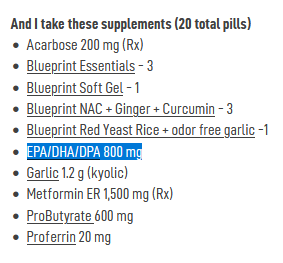L_H
#41
Great study, thank you for posting. 49% reduction is enormous.
Worth noting that ezetimibe lowers ala absorption (and maybe dha and EPA too). So worth people upping intake in diet.
2 Likes
I would think vinegar (whether from apples or malt) has the ability to increase acetyl-CoA. However, I would be concerned about the fact that it is acidic and there is a question as to how much acid the body can tolerate.
L_H
#43
Thanks John, This looks interesting: 29ml of vinegar to boost total time to exhaustion in cyclists.
They found an increase but failed to achieve significance given the limitations of the study.
Given my “smorgasbord approach” to things what else could i add to my acetyl coa foods:
apple cider vinegar, * Oranges
- Lemons
- Limes
- Pomegranates
- Grapefruit
- Tangerine
- Passion fruit
- Magnesium citrate supplement (low dose)
Is there anything else i could do without resorting to supplements?
2 Likes
JuanDaw
#44
The increase seems minimal, between water and vinegar. Sugar reduces performance, and nullifies the effect of vinegar.
| Variable |
Water |
Sugar |
Vinegar |
SUG + VIN Combination (CBO) |
p-Value |
|
(H2O) |
(SUG) |
(VIN) |
|
|
| Total Time to Exhaustion (secs) |
147 ± 8 |
136 ± 7 |
152 ± 7 |
144 ± 7 |
0.25 |
| Heart Rate (bpm) |
169 ± 2 |
170 ± 2 |
168 ± 2 |
171 ± 2 |
0.11 |
1 Like
L_H
#45
Yes true, but even a small boost to mitochondrial function (if that’s what this is) would be good if it comes at zero risk. We lose about 8% function per decade. So this would equate to about 4.5 years!
I enjoy cider vinegar already as part my normal food and drink, so if upping it slightly can improve my mitochondria it seems worth it. Especially if i can combine with other acetyl coa boosters
1 Like
I would be careful with too much acid. Supplements IMO are better as you can control more variables.
2 Likes
JuanDaw
#47
I thought you were after (cycling) sprint performance. Black currant seems to be helpful.
Results
If the students took the supplement [NZBC- New Zealand Black Currant], they covered an average of 10.8 percent more distance in their sprints than if the students had taken a placebo. In 4 subjects - the best responders - that distance even increased by 15 percent.
1 Like
L_H
#48
Sadly sprint performance is low down on my priority list. Like the study though.!
Neo
#49
Did anyone see the estimated magnitude?
Interesting that the used some form of MR methodology…. (@A_User )
Neo
#50
Has anyone looked into which brand(s) might be best from this perspective?
I’ve been using Carlson’s after a discussion of Omega 3 supplements by Peter Attia and the company claims:
”every product is tested by an FDA-registered laboratory for potency and quality“
But I haven’t double clicked on that or compared with others.
To ensure freshness, Maximum Omega 2000 is closely managed from sea to store. We source the highest quality, deep, cold-water fish using traditional, sustainable methods. And like all Carlson omega-3s, freshness, potency, and purity are guaranteed.
Neo
#51
The product I take (see post directly above) is 1250mg EPA / 500mg DHA. May I ask you, how that compares to your thoughts on optimal EPA/DHA ratios?
scta123
#52
I believe getting O3 from food is the most reliable source. I eat a handful of walnuts (2,5g of O3) and cod liver on toasted sourdough few times a week (20g of cod liver gives you almost 3g of O3). Cod liver is really good, some call it “foie gras” of the sea.
2 Likes
Neo
#53
I think I’ll keep going for a mix (also have to take into account heavy metals, etc).
Btw, note that in the study
O3 supplementation had a more reliable effect/association than the dietary fish…
3 Likes
A_User
#54
I haven’t looked at MR used for dietary intakes, that feels like it is opening a can of worms. Higher BMI genes I have heard are in the brain for example, so it might be more subject to pleiotropy. I could look at it at some point. Until I know more I won’t use any such studies personally. I like MR studies that have clear mechanism of actions and proven in other areas as well.
I take 300 mg EPA / 500 mg DHA a day for brain and focus.
1 Like
Interesting. I have long taken a low daily dose of fish oil because I eat fish nearly everyday. I haven’t had my omega 3’s tested yet to confirm it’s working.
Neo
#56
I’ll be re-testing towards the end of the month. Will use the Tom Dayspring (and I think Peter Attia) recommended
they also have a streamlined, cheaper version
very easy as you just to it from home.
@约瑟夫_拉维尔 , btw, have you tested for heavy metals if you eat fish that often?
2 Likes
Neo
#57
Any thoughts on that @Olafurpall and others seems to suggest that higher EPA / DHA ratio may be better?
No testing for heavy metals. I don’t have any reason to think I’m having a problem in that area.
I eat smaller, wild caught fish.
1 Like
A_User
#59
I don’t know anything about it, I’m having flashbacks to O3:O6 ratio and it’s not good.
The supplement I take is based on algae oil so I don’t think there is any other ratio from that source.
1 Like
A_User
#60
Funny, I just realized Bryan Johnson swapped to the same Omega-3 supplement I take. He takes double the dosage for 600 mg EPA and 1000 mg DHA in total. That might be better for at least focus and attention.

I don’t know whether he thinks the ratio between EPA and DHA is important or not.